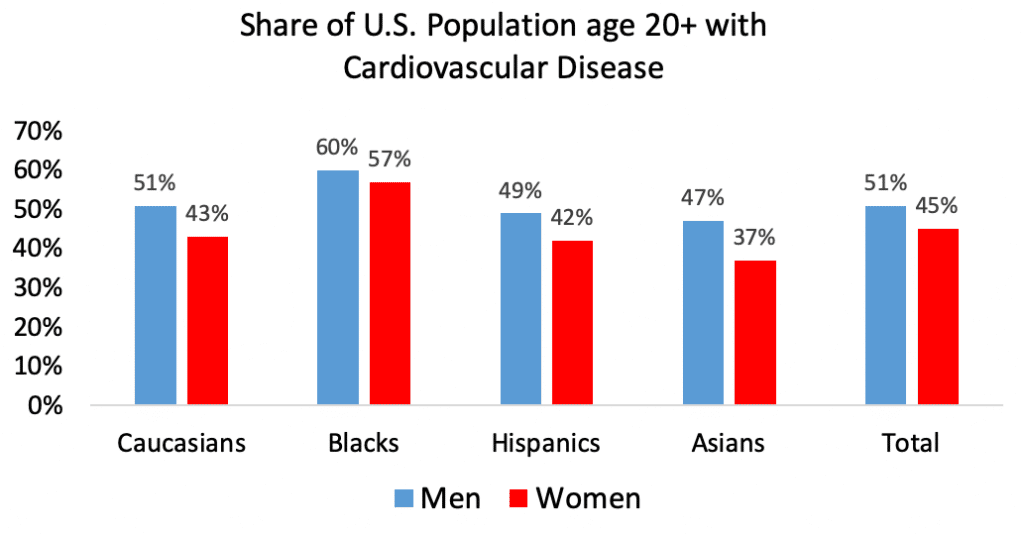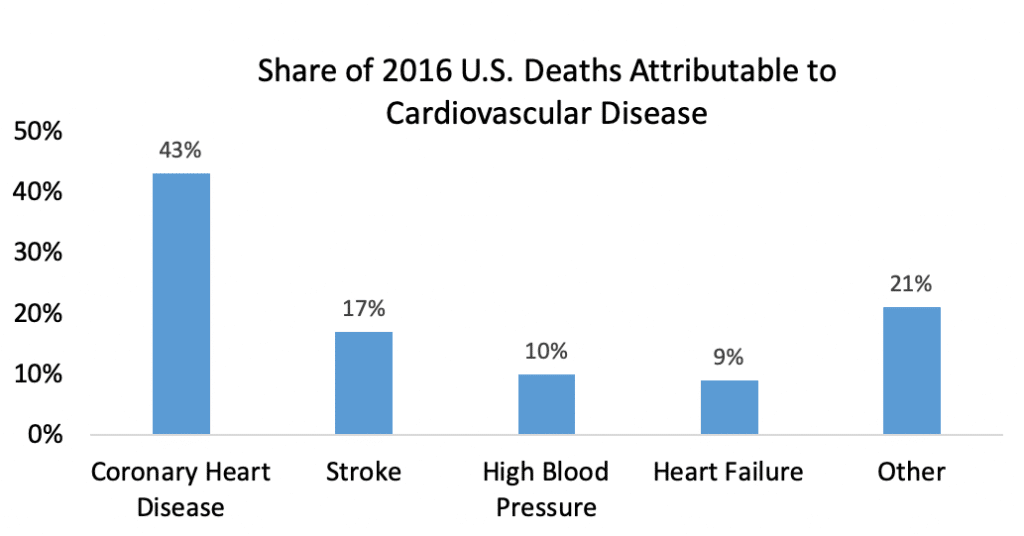Home » How common is heart disease?
How common is heart disease?
Heart disease is the #1 cause of death for both men and women in the U.S. and worldwide.1 Almost half of the American population has some form of heart disease, which includes a range of conditions affecting the heart (see details below). In 2016, cardiovascular disease (CVD) was listed as the underlying cause of death for 841K people in the U.S., a staggering 1 out of every 3 deaths.2 The prevalence of CVD is higher among certain ethnicities, as shown in the chart below.
Disease Information
- What is heart (cardiovascular) disease?
- How common is heart disease?
- Can I reduce my risk of developing heart disease?
- Why should I have health screenings done if I have no symptoms?
- Which Life Line Screening blood screenings check for heart disease risk factors?
- What is an Annual Wellness Visit?
- What makes Life Line Screenings disease risk assessment different from the others available?

What is heart disease?
Cardiovascular disease (CVD) can take many forms, and includes a range of conditions that affect the heart. These include coronary artery disease, heart failure, stroke, and high blood pressure. The good news is that fewer Americans are smoking and more Americans are increasing their physical activity, both of which have improved the statistics regarding heart disease. The bad news is that in 2017, guidelines for high blood pressure were changed, and many more people than before are now considered to have high blood pressure, putting them at higher risk for having heart attacks or strokes.

Coronary heart disease
Coronary heart disease (also known as coronary artery disease) is the most common form of CVD, and occurs when the arteries that supply your heart with blood become diseased, usually because plaque builds up. Plaque buildup in the arteries not only affects blood flow, but it injures the arteries, making them stiffer and less flexible. That’s why this disease is sometimes referred to as “hardening of the arteries”. Coronary heart disease develops over decades, and most of the time without any symptoms at all. For many people, the first symptom of coronary heart disease is a heart attack.
Stroke
Stroke is the #5 cause of death in the U.S., with someone experiencing a stroke every 40 seconds. A stroke occurs when blood flow to your brain is interrupted, and is a medical emergency. The most common type of stroke is an ischemic stroke, accounting for about 87% of strokes. An ischemic stroke occurs when a blood vessel that supplies blood to the brain becomes blocked, by either plaque buildup or a blood clot. Another type of stroke is a hemorrhagic stroke, which is the cause of about 13% of strokes. A hemorrhagic stroke occurs when a weakened blood vessel breaks and bleeds, and the primary cause is uncontrolled high blood pressure.
High Blood Pressure
High Blood Pressure (HBP), also called hypertension, is when the force of blood pumping against the wall of the arteries is high enough to cause health problems over time. HBP is extremely common, affecting most people after age 60. In 2017 the guidelines for what is considered HBP were changed, dictated by new research on heart disease. The new guidelines state that anyone with a blood pressure reading of 130/80 or higher (either systolic or diastolic) is at a higher risk for developing heart disease.4 All adults over the age of 18 should have their blood pressure checked at least every 2 years. Those who have been diagnosed with HBP should take their medication exactly as prescribed and do everything they can to manage their HBP to minimize the risk for developing heart disease.
Heart Failure
Heart failure is a term used to describe a condition where the heart simply can’t keep up with supplying all the body’s organs with the blood it needs to stay healthy. Coronary artery disease and high blood pressure can both cause heart failure, because they can leave your heart too weak to pump efficiently. Heart failure is normally progressive, which means it gets worse over time. There are ways to manage heart failure with medication and lifestyle changes. Talk to your doctor if you are experiencing these symptoms of heart failure: fatigue, shortness of breath, irregular heartbeat, swelling of your legs, or persistent coughing.5
1Centers For Disease Control,cdc.gov/heartdisease/facts.htm
2American Heart Association,https://professional.heart.org/idc/groups/ahamah-public/@wcm/@sop/@smd/documents/downloadable/ucm_503396.pdf
3American Stroke Association,https://www.strokeassociation.org/en/about-stroke/types-of-stroke
4Mayo Clinic,https://www.mayoclinic.org/diseases-conditions/high-blood-pressure/symptoms-causes/syc-20373410
5Mayo Clinic,https://www.mayoclinic.org/diseases-conditions/heart-failure/symptoms-causes/syc-20373142